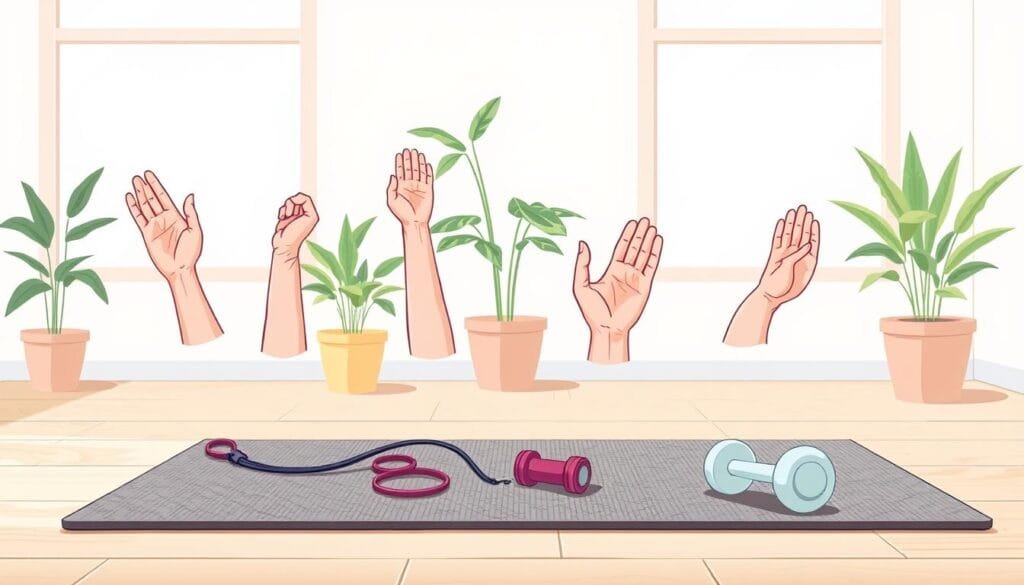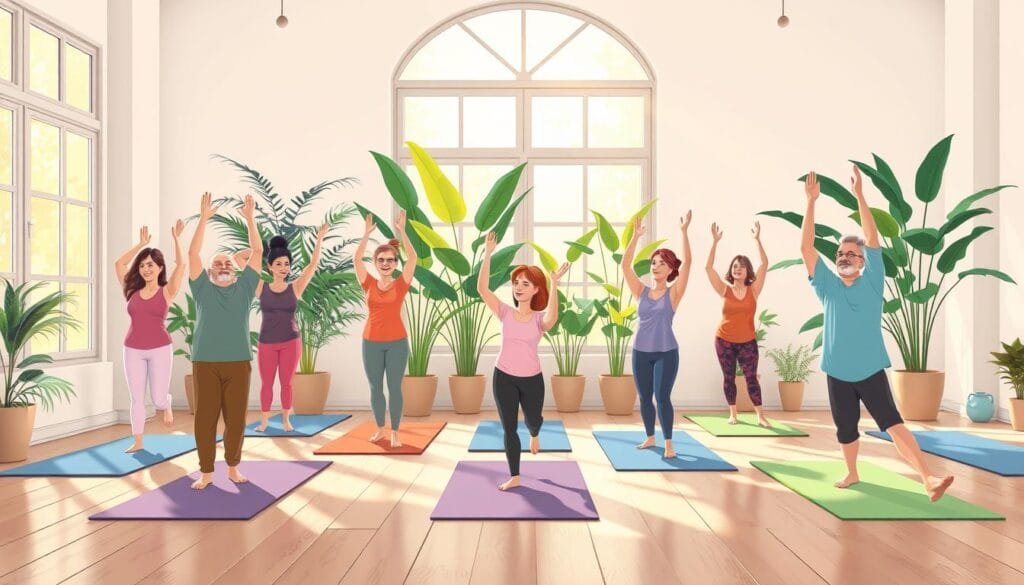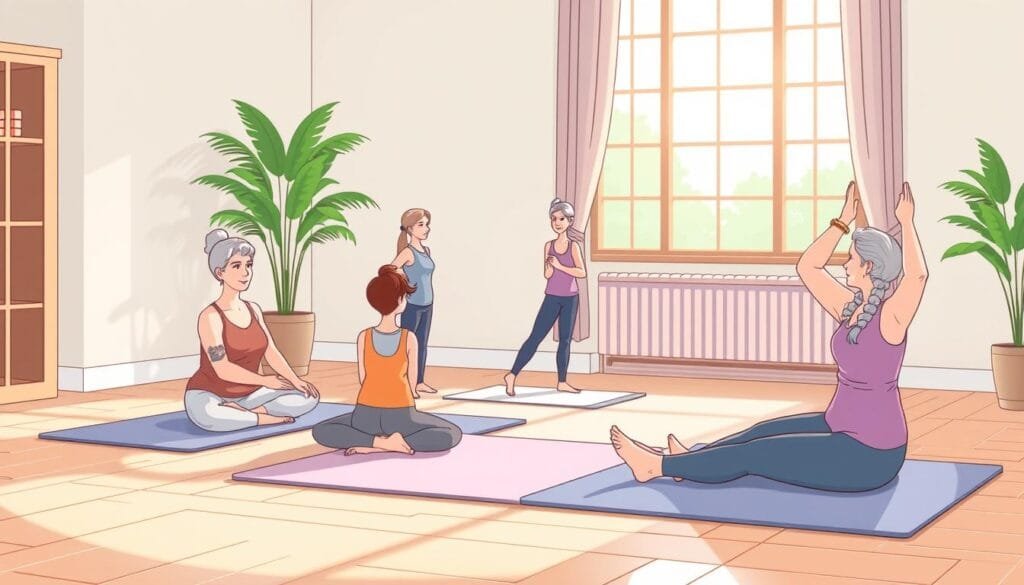As the sun peeked through the window, Sarah, a vibrant 65-year-old, decided it was time to tackle her nagging arthritis. She had heard that exercise could be a game-changer. But the thought of intense workouts filled her with apprehension. Little did she know that simple, low-impact exercises could be the key to reclaiming her mobility and reducing her joint pain.
Sarah’s story is not unique. Millions of Americans struggle with the debilitating effects of arthritis. This condition can rob them of their independence and joy in everyday activities. But the good news is that with the right approach, exercise can be a powerful ally in the fight against arthritis pain.
Key Takeaways
- Exercise can help strengthen muscles around joints, maintain bone strength, and increase energy levels for those with arthritis.
- Consulting a healthcare provider is essential before starting an exercise program, as the best exercises depend on the type of arthritis and affected joints.
- Range-of-motion exercises, strengthening exercises, and low-impact aerobic activities can all be beneficial for managing arthritis pain.
- Incorporating a warm-up and cool-down into your exercise routine is important to prevent further joint discomfort.
- Listening to your body and starting slowly is crucial when beginning an exercise regimen for arthritis.
Benefits of Exercise for Arthritis Pain Relief
Exercise is a powerful tool in managing arthritis pain. It can help whether you have osteoarthritis or rheumatoid arthritis. Regular physical activity offers many benefits that can greatly improve your life. Let’s look at how arthritis pain relief exercises, joint strengthening exercises, bone health exercises, and energy-boosting exercises for arthritis can help.
Strengthens Muscles Around Joints
Exercise is great for strengthening the muscles around your joints. These muscles help protect your joints from damage. They also reduce strain during daily activities.
Helps Maintain Bone Strength
Regular exercise, especially weight-bearing activities, keeps your bones strong. This is important for people with arthritis. It helps prevent bone loss and reduces the risk of fractures.
Increases Energy Levels
Arthritis can make you feel tired and drained. But, energy-boosting exercises for arthritis can help. Regular physical activity increases your energy. This makes it easier to do daily tasks and enjoy an active lifestyle.
| Exercise Type | Benefits for Arthritis |
|---|---|
| Range-of-Motion Exercises | Improve joint flexibility and mobility |
| Strengthening Exercises | Increase muscle strength to support joints |
| Low-Impact Aerobic Exercises | Enhance cardiovascular health and energy levels |
Before starting any new exercise, talk to your healthcare provider. They can create a plan that fits your specific needs. With the right arthritis pain relief exercises, you can manage your symptoms and improve your well-being.
Consult Your Healthcare Provider First
Before starting or changing an exercise program for arthritis pain, talk to your healthcare provider. They can check if you’re healthy enough and suggest the best exercises for you. Getting their approval is key to safely adding exercise to your treatment plan.
Your healthcare provider knows the right exercises to ease your symptoms without harm. They might suggest exercises that improve movement, strengthen muscles, and are low-impact. They can also help you gradually increase your workouts and watch how your body reacts.
It’s especially important to get professional advice if you’re in constant pain (6-8 on a 1-10 scale) or if current pain relief methods aren’t working. Your healthcare provider can find the cause of your arthritis and create a treatment plan with exercise as a main part.
Remember, getting medical approval for your exercise program is vital for your safety and to get the most benefits. By working with your healthcare provider, you can make an exercise plan that helps with your arthritis pain and improves your health.
Range-of-Motion Exercises for Arthritis
If you have arthritis, range-of-motion exercises can really help. These exercises move your joints through their full range. This can make your joints more flexible and mobile.
Stretching for Improved Joint Flexibility
Stretching is key in an arthritis exercise plan. It boosts joint flexibility and lowers injury risk. Here are some stretches to try:
- Arm overhead stretch: Reach your arms up overhead and gently stretch, feeling the stretch through your shoulders and upper back.
- Shoulder rolls: Slowly roll your shoulders forward and backward, allowing your joints to move through their full range of motion.
- Wrist and hand stretches: Gently bend your wrists and fingers in different directions to keep your hands and wrists flexible.
Always listen to your body and stop if you feel sharp or excessive pain. Start with gentle stretches. Gradually increase the stretch range and time as you get more flexible.
Doing range-of-motion exercises and stretching for arthritis joint flexibility regularly can greatly improve your joint health. By adding these simple movements to your daily routine, you can reduce stiffness, improve flexibility, and ease arthritis symptoms.
Strengthening Exercises for Arthritic Joints
Strengthening exercises can change how you manage arthritis pain. Building strong muscles around joints offers support and protection. Using resistance bands, hand weights, or machines targets major muscle groups and improves joint stability.
Try to do strengthening exercises every other day, aiming for two sessions a week. This regular effort strengthens muscles and supports joints. Start slowly and increase intensity as you get stronger.
| Exercise | Reps | Hold Time | Frequency |
|---|---|---|---|
| Straight-Leg Raise | 10 per leg | 10 seconds | Daily |
| Muscle Stretching | 5 per leg | 5 seconds | Daily |
| Leg Stretch | 10 per leg | 5 seconds | Daily |
| Straight-Leg Raise (Lying) | 5 per leg | – | Twice Daily |
| Step-Ups | 3 sets to failure | – | 2-3 times per week |
| Sit/Stands | 3 sets to failure | – | 2-3 times per week |
| Quads with Roll | 10 per leg | – | 2-3 times per week |
| Leg Cross | 3 sets | Hold until tense | 2-3 times per week |
Always talk to your healthcare provider before starting new exercises, especially with arthritis. They can create a plan that fits your needs and limits. With patience and regular effort, these exercises can greatly help manage joint pain.
“Strengthening the muscles around arthritic joints is key to providing much-needed support and protection. Consistent weight training can make a world of difference in managing pain and improving joint stability.”
– Jay Milomo, Physiotherapist with Rheumatoid Arthritis
Low-Impact Aerobic Exercises
If you have arthritis, adding low-impact aerobic exercises to your routine can help a lot. These activities boost your heart rate without stressing your joints too much. This makes them perfect for easing arthritis symptoms.
Walking for Arthritis Pain Relief
Walking is a great, easy exercise for people with arthritis. It strengthens the muscles around your joints and improves flexibility. It also helps you stay at a healthy weight, which can reduce pain.
Try to walk for 30 minutes to an hour each day. Start slow and gradually increase your pace and distance as you get fitter.
Swimming and Water Aerobics
Swimming or water aerobics is another excellent choice. The water’s buoyancy reduces joint pressure, making movement easier and less painful. These activities also boost your heart health, muscle strength, and flexibility.
Make sure to include swimming or water aerobics in your weekly routine. It’s a great way to keep your joints happy.
| Exercise | Benefits for Arthritis | Recommended Frequency |
|---|---|---|
| Walking | Strengthens muscles, improves flexibility, and helps manage weight | 30 minutes to 1 hour, most days of the week |
| Swimming/Water Aerobics | Reduces joint stress, improves cardiovascular fitness, muscle strength, and flexibility | 2-3 times per week |
Always talk to your doctor before starting any new exercise, especially with arthritis. They can create a safe, effective plan just for you.
Other Beneficial Activities
There are more ways to help with arthritis besides regular exercises. Activities that focus on movement, balance, and relaxation can be very helpful. Gentle yoga for arthritis and tai chi for arthritis can make you feel better. They improve balance, posture, and overall health. They also help ease tension and promote balance and relaxation exercises for arthritis.
Yoga and Tai Chi for Balance and Relaxation
Studies show that yoga makes joints more flexible and muscles stronger for people with arthritis. Tai Chi, meanwhile, boosts balance, reduces stress, and eases pain. Both are great additions to your arthritis care plan.
- Yoga for arthritis helps improve flexibility and muscle strength.
- Tai chi for arthritis enhances balance and promotes relaxation.
- These gentle movements can ease joint pain and stiffness.
Adding yoga for arthritis and tai chi for arthritis to your routine can be very beneficial. They bring balance and relaxation to your arthritis management.
“Gentle forms of yoga and tai chi can improve balance, posture, and overall well-being, while also helping to ease tension and promote relaxation.”
Tips for Protecting Your Joints
Living with arthritis means taking care of your joints during exercise. Choose low-impact activities and use heat and ice therapy. This helps reduce joint stress and eases pain.
Keep the Impact Low
Go for low-impact exercises that don’t stress your joints too much. Try stationary cycling, elliptical training, or swimming. These keep your muscles active without harming your joints.
Use Heat Before and Ice After Exercise
Apply heat to your joints before working out. It warms up your muscles and boosts flexibility. Then, use ice after to cut down on inflammation and pain. This combo is great for managing arthritis pain and protecting your joints.
“Regular exercise is one of the best ways to manage arthritis pain and maintain joint health. By using a combination of low-impact activities and heat/ice therapy, you can enjoy the benefits of exercise while minimizing the risk of joint damage.”
Always listen to your body and talk to your healthcare provider about your exercise plan. With the right steps and a plan that fits you, you can stay active and keep your joints healthy.
arthritis pain relief exercises
Living with arthritis pain can be tough. But, the right exercises can help a lot. Look for low-impact activities that strengthen muscles, improve joint movement, and boost fitness.
Here are some top exercises for arthritis pain relief:
- Walking – A simple, low-impact activity that reduces joint pain and improves heart health.
- Swimming and Water Aerobics – Water’s buoyancy eases joint pressure, making these exercises gentle yet effective.
- Cycling – Whether outdoors or on a recumbent bike, cycling strengthens leg muscles without high-impact stress on the joints.
- Elliptical Machine – Using an elliptical trainer provides a low-impact cardio workout that’s easy on the joints.
Adding these exercises to your routine can help manage arthritis symptoms and keep you mobile. Start slow, listen to your body, and gradually increase workout intensity and duration as you get stronger.
| Exercise | Recommended Repetitions |
|---|---|
| Standing Leg Lifts | 15-20 times per side |
| Sit-to-Stand | 1 minute |
| Kick-backs | 10-25 times per session, a few times a day |
| Clam Exercise | 10-25 times per side, twice daily |
Combining low-impact aerobic exercises, strength training, and flexibility work can manage arthritis pain and improve joint health. Talk to your healthcare provider to create a personalized exercise plan that fits your needs and goals.
Warm-Up and Cool-Down Routines
Getting ready for exercise is key, especially with arthritis. Warming up and cooling down can prevent injuries and reduce joint pain. Start with 3-5 minutes of light activity like walking or marching in place. After your workout, spend at least 5 minutes on light activity or stretching to cool down.
Dr. Amy Ashmore suggests using dynamic movements for warm-ups. Try hip circles and arm circles for 20 circles in each direction. High-stepping and heel-to-toe walk are also good options, done five times on each leg.
The lunges with a twist and step up and over exercises are also great. Repeat each five times on each side or leg.
After your workout, gentle stretching is crucial. Hold each stretch for at least 30 seconds. Avoid bouncing to prevent injury. Instead, relax into the stretch and breathe deeply.
| Warm-Up Exercise | Recommended Repetitions |
|---|---|
| Hip Circles | 20 circles in each direction |
| Arm Circles | 20 circles in each direction |
| High-Stepping | 5 times on each leg |
| Heel-to-Toe Walk | 5 times on each leg |
| Lunges with a Twist | 5 times on each side |
| Step Up and Over | 5 times on each leg |
Proper warm-up and cool-down routines can improve your mobility and reduce muscle tension. They also help with better posture. Always listen to your body and avoid exercises that cause pain. With the right preparation, you can enjoy exercise while managing your arthritis symptoms.
Arthritis Exercise Programs and Resources
If you have arthritis, you might wonder about good exercise programs for you. The good news is many resources can help ease your pain through exercise.
Hospitals, clinics, and health clubs have arthritis exercise programs. These are made by experts to help with joint flexibility, muscle strength, and mobility. The Arthritis Foundation, for example, offers classes and resources across the U.S.
Some well-known arthritis exercise programs include:
- Arthritis Foundation Aquatic Program: Meets 2-3 times a week for 1 hour, 6-10 weeks
- Arthritis Foundation Exercise Program: Meets 2-3 times a week for 1 hour
- Active Living Everyday: Meets once a week for 12-20 weeks
- Enhance®Fitness: Includes classes that meet 3 times a week for 1 hour
- Fit & Strong!: 90-minute classes, 3 times per week for 8 weeks
- My Knee Exercise Program: 6-month leg strengthening program for knee osteoarthritis
- Walk with Ease: Group sessions meet 3 times per week for 6 weeks
- Tai Ji Quan: Moving for Better Balance®: 2 one-hour sessions each week for 24 weeks
There are also educational materials, online videos, and apps from places like the Arthritis Foundation, CDC, and NIH. These are great resources for learning more about arthritis exercise.
Talking to your doctor or local arthritis group can help find the best program for you. Starting a new exercise plan can seem scary, but with the right help, you can manage your arthritis pain and feel better.
Gradual Progression and Listening to Your Body
When starting an exercise routine for arthritis, it’s key to go slow. Gradually increase the duration and intensity of your workouts. This helps your body get stronger and avoid injuries or making symptoms worse.
Also, listening to your body with arthritis is very important. Some pain is okay when you’re active, but sharp or getting worse pain means it’s time to stop. Always listen to your body and adjust your routine if needed.
- Start with low-impact exercises and gradually increase the intensity and duration over time.
- Pay attention to how your body responds to different exercises and adjust your routine as needed.
- If you experience sharp or worsening pain, stop and consult your healthcare provider before continuing.
- Incorporate a warm-up and cool-down routine to help prepare your body and aid in recovery.
- Consider working with a physical therapist or certified fitness professional to ensure proper form and progression.
Remember, the key to managing arthritis through exercise is to gradually increase arthritis exercise and listen to your body with arthritis. By being careful and adapting, you can safely improve your symptoms and health.
“Consistency is key for managing arthritis symptoms, along with a healthy diet rich in anti-inflammatory foods and staying well-hydrated.”
| Exercise Type | Benefits | Precautions |
|---|---|---|
| Stretching | Improves flexibility and range of motion | Avoid overstretching or pushing too hard |
| Strength Training | Builds muscle strength and supports joint stability | Start with low weights and gradually increase |
| Low-Impact Aerobics | Enhances cardiovascular health and endurance | Choose low-impact activities like swimming or cycling |
| Balance and Coordination | Improves stability and reduces fall risk | Use assistive devices if needed and start slowly |
Exercise for Improved Stability and Mobility
Keeping your joints stable and mobile is key when you have arthritis. The good news is that specific exercises can help. They can improve how your joints work and lessen pain. Regular physical activity can greatly enhance your life quality.
Strengthening the muscles around your joints is a big plus of exercise for arthritis. Studies show that doing strength training two to three times a week can really help. Activities like lifting weights or using resistance bands can build muscle. This gives your joints better support and stability.
Balance and flexibility exercises are also very helpful. Walking 20-30 minutes a day can make a big difference in how your joints feel. Dynamic stretching is better than static stretching for improving mobility and performance.
Other exercises that can help with stability and mobility include:
- Ankle mobility exercises to improve balance and prevent falls
- Walking hip openers to target multiple muscles and enhance overall stability
- Thoracic spine windmills to promote mobility in the upper back
- Shoulder pass-throughs to alleviate tightness in the chest and shoulders
- Neck half circles to improve neck mobility and reduce pain
Adding exercises that focus on stability and mobility to your routine can help manage your arthritis. It can also improve how your joints function. Always talk to your healthcare provider before starting any new exercise program.
| Exercise | Benefits | Targeted Muscles |
|---|---|---|
| Ankle Mobility | Improved balance, fewer falls, enhanced performance | Ankles, feet, and lower legs |
| Walking Hip Openers | Enhanced overall stability and balance | Glutes, hip flexors, hip extensors, hip abductors, and hip adductors |
| Thoracic Spine Windmills | Improved mobility in the upper back | Core, upper back, spine stabilizers, and obliques |
| Shoulder Pass-Throughs | Alleviated tightness in the chest and front of the shoulder | Rotator cuff, anterior deltoid, chest, and upper back |
| Neck Half Circles | Improved neck mobility, reduced pain in the neck, head, and upper back | Neck flexors and extensors, trapezius |
By adding exercises that focus on stability and mobility to your routine, you can manage your arthritis better. Remember to always talk to your healthcare provider before starting any new exercise program.
Safety Precautions for Exercising with Arthritis
Living with arthritis means you need to be careful when you exercise. Taking the right steps can help you enjoy working out without hurting your joints more. This way, you can still get the benefits of exercise.
Seek Professional Guidance
Always talk to a doctor or physical therapist before starting any workout plan. They can create a plan just for you. This ensures you’re doing safe and effective exercises for your arthritis.
Start Slowly and Build Up
It’s important to start slowly when exercising with arthritis. Gradually increase how long and hard you work out. This helps your body adjust and prevents more damage to your joints.
By following these tips, you can safely add exercise to your routine. This can help reduce pain, improve joint function, and make your life better overall.
Conclusion
Adding the right exercises to your routine can help manage arthritis symptoms. It can also improve your life quality. Start by talking to your doctor, choose low-impact activities, and slowly increase workout intensity. This can help reduce joint pain and boost mobility.
Remember to listen to your body and start slowly. Always seek professional advice for a safe and effective exercise plan. This way, you can keep your independence and stay active.
Regular physical activity tailored to your needs can change your life with arthritis. It strengthens muscles, keeps bones strong, and boosts energy. By making exercise a part of your life, you can control your pain and live more actively and happily.
This article on arthritis exercise encourages you to embrace movement. Work with your healthcare provider to create an exercise plan that fits you. By following the advice in this article, you can use exercise to ease pain and enhance your well-being.
FAQ
What are the benefits of exercise for arthritis pain relief?
What types of exercises are best for managing arthritis pain?
Should I consult a healthcare provider before starting an exercise program for arthritis?
How can range-of-motion exercises help with arthritis?
What are some examples of strengthening exercises for arthritis?
What types of aerobic exercises are recommended for people with arthritis?
How can activities like yoga and tai chi benefit those with arthritis?
What precautions should I take when exercising with arthritis?
Where can I find specialized exercise programs and resources for arthritis?
How can I safely and effectively incorporate exercise into my arthritis management routine?
Source Links
- How do exercise and arthritis fit together? – https://www.mayoclinic.org/diseases-conditions/arthritis/in-depth/arthritis/art-20047971
- Simple Arthritis Exercises to Relieve Your Joint Pain | TYLENOL® – https://www.tylenol.com/adult-relief/arthritis/arthritis-relief-exercises
- Why Exercising Matters When You Have Arthritis (and Exercises To Try) – https://health.clevelandclinic.org/arthritis-exercises
- No title found – https://www.arthritis.org/health-wellness/healthy-living/physical-activity/getting-started/benefits-of-exercise-for-osteoarthritis
- Why is exercise important for people with arthritis? – https://versusarthritis.org/about-arthritis/exercising-with-arthritis/why-is-exercise-important/
- Patient education: Arthritis and exercise (Beyond the Basics) – https://www.uptodate.com/contents/arthritis-and-exercise-beyond-the-basics/print
- 16 Hand and Wrist Exercises To Ease Arthritis Pain – https://health.clevelandclinic.org/hand-exercises-for-arthritis
- How to Exercise with Arthritis: Tips From Physical Therapists – https://www.hingehealth.com/resources/articles/exercise-for-arthritis/
- Range-of-Motion Exercises for Arthritis You Should Do Every Day – https://creakyjoints.org/diet-exercise/range-of-motion-exercises-for-arthritis/
- Exercises for Knee Osteoarthritis and Joint Pain – https://www.webmd.com/osteoarthritis/ss/slideshow-knee-exercises
- Hand exercises for people with arthritis – https://www.mayoclinic.org/diseases-conditions/arthritis/in-depth/arthritis/art-20546847
- Exercises for the knees – https://versusarthritis.org/about-arthritis/exercising-with-arthritis/exercises-for-healthy-joints/exercises-for-the-knees/
- No title found – https://www.arthritis.org/health-wellness/healthy-living/physical-activity/other-activities/best-exercises-for-rheumatoid-arthritis
- Here are low-impact exercises that may ease your arthritis pain | CNN – https://www.cnn.com/2023/02/10/health/exercises-for-arthritis-pain-relief-wellness/index.html
- 16 Gentle Exercises for People With Arthritis – https://www.health.com/condition/rheumatoid-arthritis/16-gentle-exercises-for-people-with-arthritis
- Exercising to Ease Osteoarthritis Pain – https://www.webmd.com/osteoarthritis/oa-exercises
- No title found – https://www.arthritis.org/health-wellness/healthy-living/physical-activity/other-activities/14-ways-to-work-out-with-arthritis
- Exercise to Treat Arthritis – https://www.webmd.com/arthritis/exercise-treat-arthritis
- Top 10 Arthritis Exercises – https://arthritis.ca/living-well/2020/top-10-arthritis-exercises
- No title found – https://www.arthritis.org/health-wellness/healthy-living/physical-activity/getting-started/8-ways-exercise-helps-joints
- Simple Exercises for Joint Health – https://www.webmd.com/osteoarthritis/ss/everyday-exercises-for-oa-slideshow
- 10 exercises for arthritis of the knee – https://www.medicalnewstoday.com/articles/311138
- Managing Arthritis Pain With Exercise – OrthoInfo – AAOS – https://orthoinfo.aaos.org/en/treatment/managing-arthritis-pain-with-exercise/
- Exercises for Arthritis Joint Pain Relief | Voltaren – https://www.voltarengel.com/living-with-arthritis/exercises/
- No title found – https://www.arthritis.org/health-wellness/healthy-living/physical-activity/other-activities/7-dynamic-warm-ups
- Warm Up, Cool Down and Be Flexible – OrthoInfo – AAOS – https://orthoinfo.aaos.org/en/staying-healthy/warm-up-cool-down-and-be-flexible/
- No title found – https://www.arthritis.org/health-wellness/healthy-living/physical-activity/getting-started/physical-activity-programs-proven-to-help-arthriti
- Osteoarthritis Self-Management – Exercise, Diet, Pain management – https://arthritis.ca/about-arthritis/arthritis-types-(a-z)/types/osteoarthritis/osteoarthritis-self-management
- About Physical Activity and Arthritis – https://www.cdc.gov/arthritis/prevention/index.html
- Exercises for Arthritis: 11 Exercises with Instructions – https://www.healthline.com/health/exercises-for-arthritis
- Exercising with Arthritis: How to Improve your Joint Pain and Stiffness – Coastal Orthopedics – https://coastalorthopedics.com/blog/exercising-with-arthritis-how-to-improve-your-joint-pain-and-stiffness/
- Exercises for Arthritis – https://www.apwuhp.com/exercising-with-arthritis-managing-osteoarthritis-pain/
- Exercises for Arthritis Pain Management at AOSMI – https://advancedorthosports.com/blog/exercises-for-arthritis-pain-management-a-comprehensive-guide-from-an-expert-pain-management-doctor/
- 5 Joint Mobility Exercises to Improve Flexibility and Function – https://www.healthline.com/health/fitness-exercise/joint-mobility-exercises
- Managing arthritis pain – https://www.mayoclinic.org/diseases-conditions/arthritis/in-depth/arthritis/art-20046440
- Safe Exercise – OrthoInfo – AAOS – https://orthoinfo.aaos.org/en/staying-healthy/safe-exercise
- Exercise & Arthritis – https://rheumatology.org/exercise-and-arthritis
- Osteoarthritis – Why Exercise? – https://www.ncbi.nlm.nih.gov/pmc/articles/PMC4350574/
- Role of Exercise in Arthritis Management – https://www.hopkinsarthritis.org/patient-corner/disease-management/role-of-exercise-in-arthritis-management/
- Exercise for Osteoarthritis: A Literature Review of Pathology and Mechanism – https://www.ncbi.nlm.nih.gov/pmc/articles/PMC9110817/













